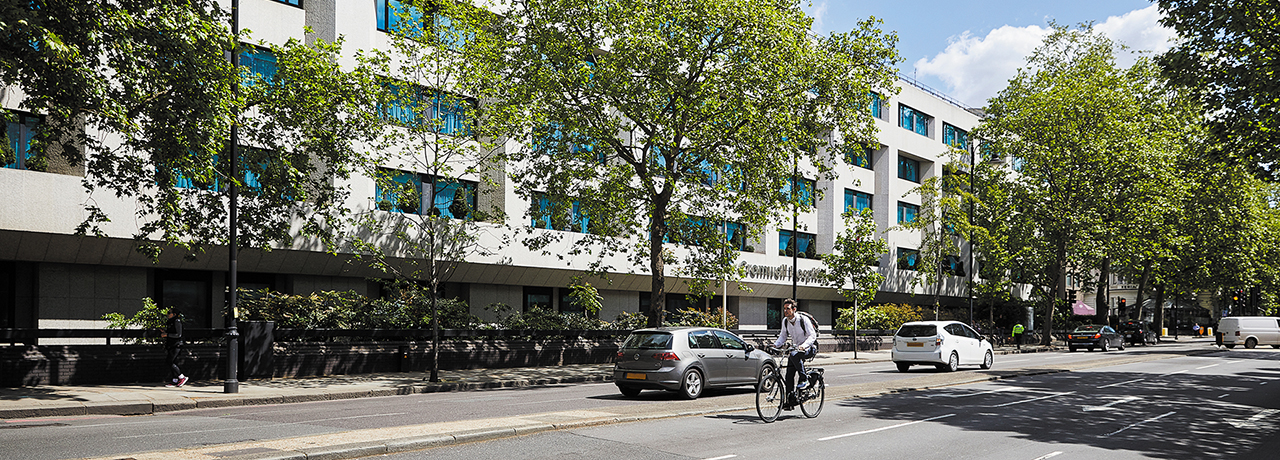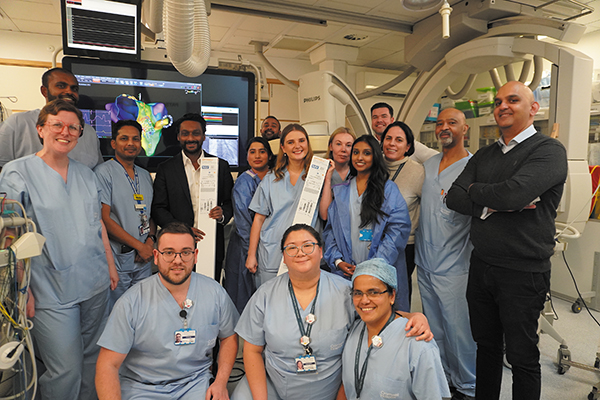Cromwell Hospital combines the expertise of its team with the latest technology to provide cardiac patients with the best standards of care

Based at our state-of-the-art hospital in South Kensington, our Heart and Lung Centre is home to three world-leading departments: cardiology, cardiothoracic surgery and respiratory medicine. The Heart and Lung Centre at Cromwell Hospital provides seamlessly coordinated care from start to finish, encompassing state-of-the-art diagnostics, the very latest treatments and the expertise of our world-class consultants.
With over 40 highly trained cardiologists, we have specialists in areas including electrophysiology, interventional cardiology and congenital heart disorders. We also provide cardiothoracic surgery for patients who need surgical intervention. We have a dedicated intensive care unit that provides one-to-one nursing for those requiring round-the-clock care post-surgery.
Mr Inderpaul Birdi, a consultant cardiac surgeon at Cromwell Hospital, says: “The dedication and expertise of the team of professionals are truly commendable. Their commitment to delivering unparalleled care ensures that our patients receive nothing short of the best.”
Atrial fibrillation, often shortened to AFib, is the most common heart rhythm condition in the UK, affecting around 1.4 million people. AFib causes the heart to beat irregularly and, often, abnormally fast.
Having atrial fibrillation can raise the risk of developing heart failure, alongside other heart-related complications, so it is important to see a specialist if you think you may be affected. If you are diagnosed with atrial fibrillation, a cardiologist will work with you to determine the best course of treatment. There are different treatment options available, depending on the severity of your case.
Convergent ablation is an innovative new type of treatment for patients with persistent atrial fibrillation, which involves a combination of two procedures: keyhole surgery and catheter ablation. Ablation is used to destroy tissue inside the heart, while surgery destroys tissue on the outside of the heart.
The surgical portion of the treatment involves using a long, thin device called a pericardioscope, which has a tiny camera and light attached to one end. This allows the surgeon to effectively see the outside of the heart and enables them to destroy any fibrillation-causing tissues with greater precision. In some cases, during the hybrid ablation procedure, the surgeon may choose to place a special clip or suture on a part of the heart called the left atrial appendage.
Convergent ablation has an 80-90% success rate, which is a 75% increase compared to other approaches. Dr Syed Ahsan, Consultant Cardiologist at Cromwell Hospital, says: “Convergent ablation is setting the new standard of care for long-standing atrial fibrillation. As well as having a high success rate, it reduces the risk of stroke in patients by 90%, improving quality of life and outcomes and reducing reliance on medications.”
Towards the end of 2024, we performed our first FARAPULSE procedure with consultant cardiologist Dr Zhong Chen. Pulsed field ablation is a new type of catheter ablation. It uses tissue-selective, non-thermal electric fields to effectively ablate the heart tissue and avoid damage to surrounding structures. Pulsed field ablation benefits from a shorter procedure time, compared to standard catheter ablation with similar outcomes.
In 12-month clinical trials that directly compared the efficacy and safety of the FARAPULSE system against standard thermal ablation, it was found that FARAPULSE was as safe and effective as conventional thermal ablation, with statistically shorter procedure times. We were one of the first private UK hospitals to provide pulsed field ablation using FARAPULSE, by Boston Scientific.
From complex heart surgeries, like valve replacement or repair, to innovative convergent AFib ablation, we are one of the few private hospitals in the UK to offer minimally invasive (keyhole) techniques in cardiothoracic surgery – over 50% of our recent surgeries were minimally invasive. In August 2023, we performed the first mini-mitral valve repair at Cromwell Hospital, with the patient making a full recovery; we have since performed 15 mini-mitral surgeries.
We are also one of the top three hospitals in the UK for the shortest post-operative length of stay. Mr Birdi says: “Cromwell Hospital’s leadership ensures seamless operations and a supportive environment for all clinical and allied professionals, empowering us to provide world-class care for our patients.”

Sandy received treatment at Cromwell Hospital in 2024 after being diagnosed with a serious heart condition. He was diagnosed and treated using minimally invasive surgery within a week by Mr Birdi and his team. Sandy says of his experience: “The staff have been phenomenal. It gave me a little hope that there are good people out there. They care so much, and they’re so dedicated to their job… I tell everyone about my experience, about the week I was here.”
In 2024, we launched a new leadless pacemaker programme (Micra™) for patients with bradycardia, led by consultant cardiologist Professor Tom Wong. Bradycardia is a heart rhythm disorder where the heart beats too slowly, which may cause those affected to feel tired, dizzy and short of breath.
Micra™ is the world’s smallest pacemaker, designed to treat bradycardia. Unlike traditional pacemakers, it leaves no bump under the skin, no chest scar, and requires no lead.
Patients who have Micra™ implanted may benefit from fewer post-implant activity restrictions and medical complications than those with traditional pacemakers. Micra™ can last for up to 18 years, depending on the heart condition and how often the device is delivering therapy.
Patients at Cromwell Hospital will have their Micra™ device placed in a 45- to 60-minute procedure and can go home the same day.
At Cromwell Hospital, we are at the forefront of cardiac care. Our leading team constantly innovates and we are proud to support our multidisciplinary team to provide the very latest cardiac care for the benefit of our patients.
In 2024, we performed our first electrophysiology procedure using the innovative Optrell catheter from Johnson & Johnson MedTech, performed by Dr Syed Ashan and Dr Neil Srinivasan, consultant cardiologists at Cromwell Hospital. The Optrell catheter represents a significant advancement in cardiac care and has the potential for enhancing precision and improving patient outcomes in diagnosing and treating arrhythmias.
We also offer cryo nerve block to eliminate almost all post-operative pain for cardiac patients. Also, in 2024, we introduced the acute coronary syndrome pathway to support patient care.
Mr Birdi says: “The most fulfilling aspect of my job is witnessing the transformation in my patients' lives. Being part of their journey towards better health, and witnessing their gratitude and relief after successful surgeries or treatments, is incredibly rewarding. There is nothing quite like seeing someone regain their vitality and quality of life.”
To find out more about cardiac care at Cromwell Hospital or to book an appointment, call:
+44 (0)20 7244 4886 (self-pay), +44 (0)20 7460 5700 (insurance)
or visit: cromwellhospital.com/heartandlung